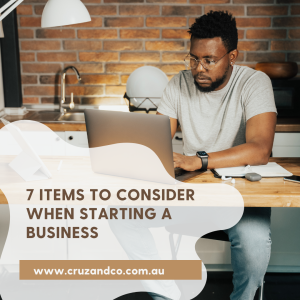 Starting a business is sometimes a reaction to an idea. I have come across many individuals who have a viable idea, then ask around for information on starting a business. Friends and acquaintances want to give their 2 cents worth of knowledge, so they impart with advice such as “apparently you can…” or “I heard…” or most commonly “My accountant said…”
Starting a business is sometimes a reaction to an idea. I have come across many individuals who have a viable idea, then ask around for information on starting a business. Friends and acquaintances want to give their 2 cents worth of knowledge, so they impart with advice such as “apparently you can…” or “I heard…” or most commonly “My accountant said…”
I met with a lady one day, who I found out did not research enough into running a business. She left the administration, managing and running of the business to other people. This was a very viable business, generating quite substantial cashflow over a number of years. The partners in the business who she trusted, left the operations to pursue their own interests. The lady came to me with a mountain of unlodged tax returns, BAS’s, compliance and cashflow issues that she was oblivious to for the past 7 years. This obviously amounted to a considerable dollar amount, and could have been prevented through some early planning and key items of knowledge.
Through my experience, here’s a list of 7 items to consider when starting a business:
- Decide on the business structure. Your medium to long term goals will drive the business structure you will set up. Things such as business risk, asset protection, tax minimisation, administration and cost of keeping the business structure will be important factors as well. These items should be discussed with your accountant in detail BEFORE setting up any type of structure, as getting this wrong could cost you more than setting it up. I have also written an article about the different business structures on this site. Be sure to check that out as well.
- Where will you source your work from, and have you researched your market? I have come across plenty of would-be entrepreneurs who have a great idea, but no sound marketing plan. Try and have some stable customers or contracts before you set out, and make sure you are ready to put in the hard yards in trying to get business.
- Learn the basics of bookkeeping and understand your tax obligations. Try and attend one of the government run courses, which can be found on the ATO site, or the small business site of your local government. The basics of keeping records is a start to learning financial management, and being on top of your finances. I’ve noticed that many people with cashflow problems in their business, usually aren’t on top of their finances. Learning the basics of bookkeeping will go a long way in the way you manage your business.
- Build your networks, and gather up a team of experts. These are people you go to for advice, mentoring and help. You may have a law expert, accountant, a mentor who has more experience than you in your industry, a network of complimentary services to yours, a broker, a graphic designer and a business coach. Try to pick people you get along most with and most importantly, can UNDERSTAND YOUR BUSINESS.
- Research, research, research. I can’t emphasize this enough. Research your product or service. Research your market. Research your sales plan. Research the area you service, the demopgraphics, your competition, the demand for your product or service. Research into the end to end sales process in great detail. Research into finances, insurance, suppliers, communication, advertising. This is just the start!
Prepare a business plan. If you fail to plan, you plan to fail. Setting out your business objectives will provide you with clear goals, and steer you in the right direction when things aren’t quite so straight forward.
There are plenty of sites who offer free business plans. Here are a few links to some sites:
Funding. Consider the start up costs of the business, and where you will source the funds from. Don’t put all your eggs in one basket – ensure you have a back up plan in case the business doesn’t go according to plan.
Analyse your break even point, so you know how many sales you need to make to recover your costs.
